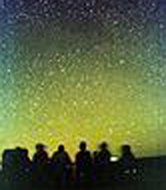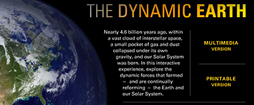
|

|

|

|
|
Have you ever gazed up at the stars and made a wish, only to see one shoot across the night's sky? Shooting stars are not stars at all. They're pieces of space rock as small as a grain of sand or as large as a boulder that get pulled by the Earth's gravity into our atmosphere, where they burn up or, on occasion, make impact. The TrueFlix unit on Meteor Showers in the Outer Space category will turn students' gaze to the heavens as they observe for evidence of passing comets and ponder how this celestial phenomenon was not always something people watched with awe and wonder. |
|
 |
|

|
|
A Multitude of Media
|

|
|
The Dynamic Earth from the Smithsonian National Museum of Natural History is a multimedia website in the Explore the Web section that offers students an opportunity to explore the Earth from far out in space or deep beneath our planet's crust. The meteorite classification tool can be used to explore the composition of various meteorite classes. As students will discover, meteorites can be the result of several different phenomenon including outer space collisions and volcanic explosions on other planets. Students can use the "Make an Impact" simulation to build a greater understanding of how and why the size and speed of the meteor affects its physical impact. Just how powerful would a meteor be if it was traveling fast enough to go from New York to Washington, D.C., in 6 seconds, and was the size of a house?
|

|
|
|

|

|

|
|
Project Idea
|

|
|
Using the information students learn from The Dynamic Earth impact simulation (located under The Solar System menu option), along with the information found in the Meteor Showers eBook, explore impact with students using a plastic or metal bowl filled with sand, a ruler, and a collection of household objects of varying size, such as a marble, a rubber eraser, and a round piece of fruit. Place a tray or sheet of plastic beneath the bowl in order to contain any sand spillage. Have the students drop each of the objects into the sand from three different heights, 6 inches above the sand, 12 inches above the sand, and 24 inches above the sand. Measure the diameter of the crater created from the impact after each drop, then have a student level the sand prior to the next drop. Repeat for each of the objects, then discuss findings in the data with the class. How did the size of the object impact the resulting crater? How did the drop height impact the crater? Did one have a greater effect than the other?
|
|
|
|

|

|
|
Matthew's Tip of the Month
|

|
|
Invite your students to witness the meteor showers occurring over this month and next. The Lyrids meteor showers are visible at their peak April 21-23 and the Eta Aquarids are best viewed
|

|
|
May 4-6. Send a note home with students inviting families to watch for the meteor showers at night before bed. Include a link to the Meteor Showers eBook and a reminder that this and other topics related to outer space can be accessed from home through an Internet-connected device. |
|
Matthew Winner
|
|
Library Media Specialist & TrueFlix Ambassador |
|
|
|

|
UPCOMING WEBINAR DATES
|

|

|
Learn more about getting the most out of TrueFlix by attending one of our monthly
online training sessions.
|

|
| We’d Love to Hear From You! |
| We’d love to hear what you think of the TrueFlix newsletter! Please
email us your thoughts or ideas on how we can make it even better! |
|

|
|

|
|

|
|